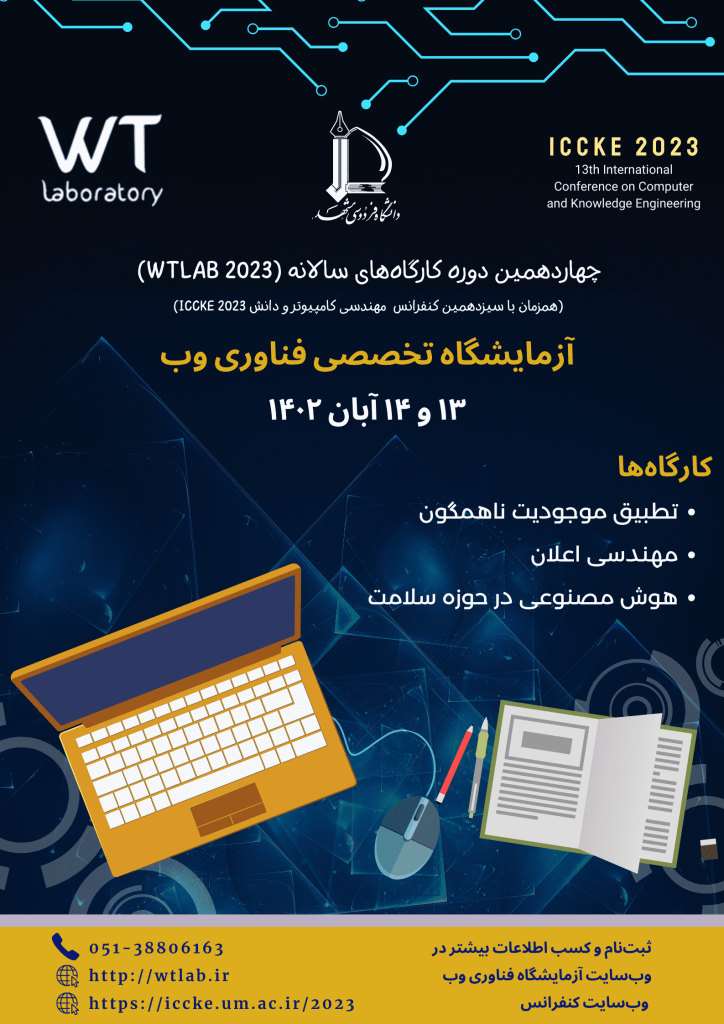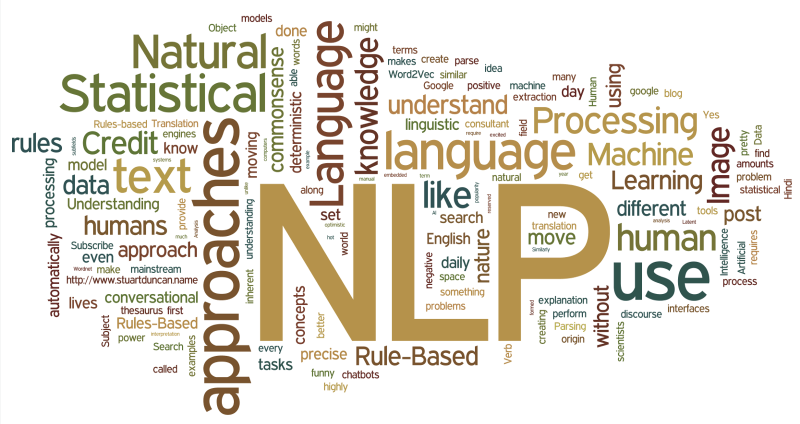
- Heterogeneous Entity Matching Saturday, November 13, 14:00-18:00 1) Behshid Behkamal, Assistant Professor, Department of Computer Engineering, Ferdowsi University of Mashhad 2) Mustafa Milani, Assistant Professor, Department of Computer Science, Western University, Ontario, Canada
- Prompt Engineering Sunday, November 14, 8:00 am to 12:00 am 1) Razieh Hashemi, Master’s student in computer engineering, software, Ferdowsi University of Mashhad, member of Web Technology Lab 2) Fatemeh Rahim Farkhani, Master’s student in computer engineering, Software, Ferdowsi University of Mashhad, member of Web Technology Laboratory
- Artificial Intelligence in Health (AI In Health) Sunday, November 14, 14:00-18:00 1) Reza Saeedi, Ph.D. student of computer engineering, software, Ferdowsi University of Mashhad, member of web technology laboratory 2) Fariba Mohammadikhah, Master of Computer Engineering, Software, Ferdowsi University of Mashhad, member of Web Technology Laboratory
Audience: undergraduate and graduate students in computer engineering, medicine, biotechnology, artificial intelligence, and all those interested in the mentioned subjects in all fields How to register: visit the wtlab.ir website and complete the registration form Benefits of participating in the workshop: receive a certificate Participation in the workshop by WTLAB web technology laboratory Registration deadline: (new) Until November 10, 1402. Time of workshops: November 13 and 14, 1401. Conducting method: online. Cost of participation in each workshop title: For the general public – 300 thousand Tomans for students of all universities (except Ferdowsi) – 200 thousand Tomans for students of Ferdowsi University. Mashhad – 150 thousand Tomans is free for wtlab laboratory students Note: Employees of public and private organizations and offices can use the student tariff (200 thousand Tomans) for registration in case of group registration of more than 3 people.
How to participate and pay:
Those who are interested in participating in this program, according to the explanations on the relevant page, can pay the participation fee in the desired workshop/workshops to the card number 6037997365537100 in the name of Mohsen Kahani at National Bank of Iran.
Important note: Please complete the participation form in the workshop after depositing the desired amount and enter the last four numbers (right side) of the card or the account number of the source of payment in the desired place in the registration form.
Details of WTLAB2023 workshops

Heterogeneous entity matching workshop information
Abstract:
Entity Matching is one of the main tasks in data science, which is necessary for data integration and cleaning. If the data sources are diverse and heterogeneous, matching the same entities is challenging. The purpose of this workshop is to deal with this complexity and examine the effect of heterogeneity on solving the entity matching problem. In this workshop, various dimensions of heterogeneity, including differences in the level of structures of two datasets, differences in characteristics, multilingualism of data among textual, semi-structured and structured data are discussed and the weaknesses of existing techniques are examined. Then, new learning-based methods such as active learning techniques, transfer learning, and representational learning designed for heterogeneous settings will be presented. Also, by examining some practical examples, the applications of entity matching in the real world are demonstrated. In the end, by referring to relevant and important areas including explainability, transparency and fairness, future open research fields will be presented.
Headlines:
- Entity Matching – Definition and Purpose – Entity Matching Process – Classification of Methods
- Understanding heterogeneous entity matching – defining the concept of heterogeneity – entity matching with languages, domains and heterogeneous data types
- Challenges of matching heterogeneous entity
- Advanced methods for adapting heterogeneous entities – active learning, learning by example, and crowdsourcing – transfer learning and domain adaptation – combining external knowledge sources
- Applications of heterogeneous entity matching
- Challenges and opportunities for future research
Providers:
- Behshid Behkamal, Assistant Professor, Department of Computer Engineering, Ferdowsi University of Mashhad
- Mustafa Milani, Assistant Professor, Department of Computer Science, Western University, Ontario, Canada
Date of holding:
Saturday, November 4, 14-18 (online)

Notification engineering workshop information
Abstract:
In recent years, the growing artificial intelligence community has made great efforts to develop large-scale artificial intelligence models (LAMs) through the massive increase in data and computing resources. Notifications, as a new technique, play a vital role in leveraging the various capabilities of large AI models. Using declarations makes it possible to direct the behavior of large AI models using explicit commands and examples. The necessity of selecting appropriate commands to drive the model introduces a concept called notification engineering. This workshop introduces large models of artificial intelligence and the necessity of using notifications to guide the behavior of these models to solve various problems, especially natural language processing, with higher accuracy and efficiency, then notification engineering and its various methods and different notification design techniques are introduced. can be At the end, some practical examples are presented along with the introduction of the OpenPrompt open source tool and the openai library.
Headlines:
- Introducing large models of artificial intelligence and the necessity of using notifications
- Application of notifications in solving natural language processing problems
- Introduction to notification engineering
- All kinds of engineering methods and notification design
- Introduction of open source tool OpenPrompt
- Introducing the openai library
Providers:
- Razieh Hashemi, Master’s student in computer engineering, software, Ferdowsi University of Mashhad, member of Web Technology Lab
- Fatemeh Rahim Farkhani, Master’s student in computer engineering, software, Ferdowsi University of Mashhad, member of Web Technology Laboratory
Date of holding:
Sunday, November 5, 8 am to 12 am

Artificial intelligence in the field of health (AI In Health)
Abstract of the first part: Computational psychology
In recent years, computational psychology has gained a special position among the researchers of computer and psychology as one of the emerging fields in terms of popularity. Extracting hidden knowledge from the mass of data recorded by psychological researchers by modern tools invented in computer science and artificial intelligence has increased the speed and accuracy of diagnosing and predicting mental disorders. In this regard, the “Artificial Intelligence in Health” research group, Ferdowsi University’s web technology laboratory, in line with the latest developments, in recent years, with the guidance of respected professors and the efforts of graduate students, has achieved valuable achievements in this field. It is hoped that we can provide an opportunity to get to know more researchers and researchers interested in this field by proposing this topic.
Headings of the first part:
Introduction of computational psychology, applications of computational psychology, analysis of social networks to diagnose and predict mental disorders, introduction of the eRisk challenge
Abstract of the second part: Identifying the side effects of drugs and vaccines from social networks Drug side effects are side effects that occur when taking drugs in normal doses. ADE is a public health issue, as it hospitalizes millions of patients worldwide each year. Early detection of ADE reduces economic costs and prevents mortality. Diagnosis of adverse drug reactions usually depends on voluntary reporting or medical information. But in recent years, user-sent data on social networks has become an important source for this. Limiting the number of words on Twitter allows users to use words in a targeted and focused way. User-provided information about drugs and their adverse effects on Twitter is an important resource for post-marketing drug monitoring. Vaccines have been one of the most successful public health interventions to date. However, vaccines are medicinal products that have risks, so that many side effects are reported after receiving the vaccine. Traditional adverse event reporting systems suffer from several critical challenges, including timeliness and inefficiency. This increases the motivation of social media-based diagnosis systems that demonstrate the successful ability to obtain timely and prevalent disease information. Social media can capture epidemic information from social sensors because they reflect public mood and trends that can be used to identify vaccine side effects. In the last decade, researches conducted in the field of identifying side effects of drugs and vaccines have widely used this valuable data source. In this workshop, we will review the research done in the field of identifying the side effects of drugs and vaccines. Headings of the second part: 1- An introduction to the extraction of drug side effects – Extraction of vaccine side effects from social networks 2- Review of research done in this field 3- Challenges in this field
Providers:
- Reza Saeedi, Ph.D. student of computer engineering, software, Ferdowsi University of Mashhad, member of web technology laboratory
- Fariba Mohammadi Khah, Master of Computer Engineering, Software, Ferdowsi University of Mashhad, member of Web Technology Lab
Date of holding:
Sunday, November 5, from 14:00 to 18:00






